Abstract
Ethnicity/race is a much-studied variable in epidemiology. There has been little consensus about what self-reported ethnicity/race represents, but it is a measure of some combination of genetic, socioeconomic, and cultural factors. The present article will attempt to: 1.) Elucidate the limitations of contemporary discourse on ethnicity/race that emphasizes the genetic and socioeconomic dimensions as competing explanatory frameworks; 2.) Demonstrate how considerable attention to the cultural dimension facilitates understanding of race differences in health-related outcomes; and 3.) Discuss interpretations of disparities in health status of African Americans versus European Americans from an ethical perspective. A major challenge to the discourse on ethnicity/race and health being limited to socioeconomic and genetic considerations is the lack of attention to the third alternative of a cultural perspective. The combined cultural ideologies of individualism and racism undermine the utility of epidemiologic research in health promotion and disease prevention campaigns aimed at reducing the racial gaps in health status. An ethical analysis supplements the cultural perspective. Ethics converge with culture on the notion of values influencing the study of ethnicity/race in epidemiology. A cultural approach to the use of ethnicity/race in epidemiologic research addresses methodological limitations, public health traditions, and ethical imperatives.
Full text
PDF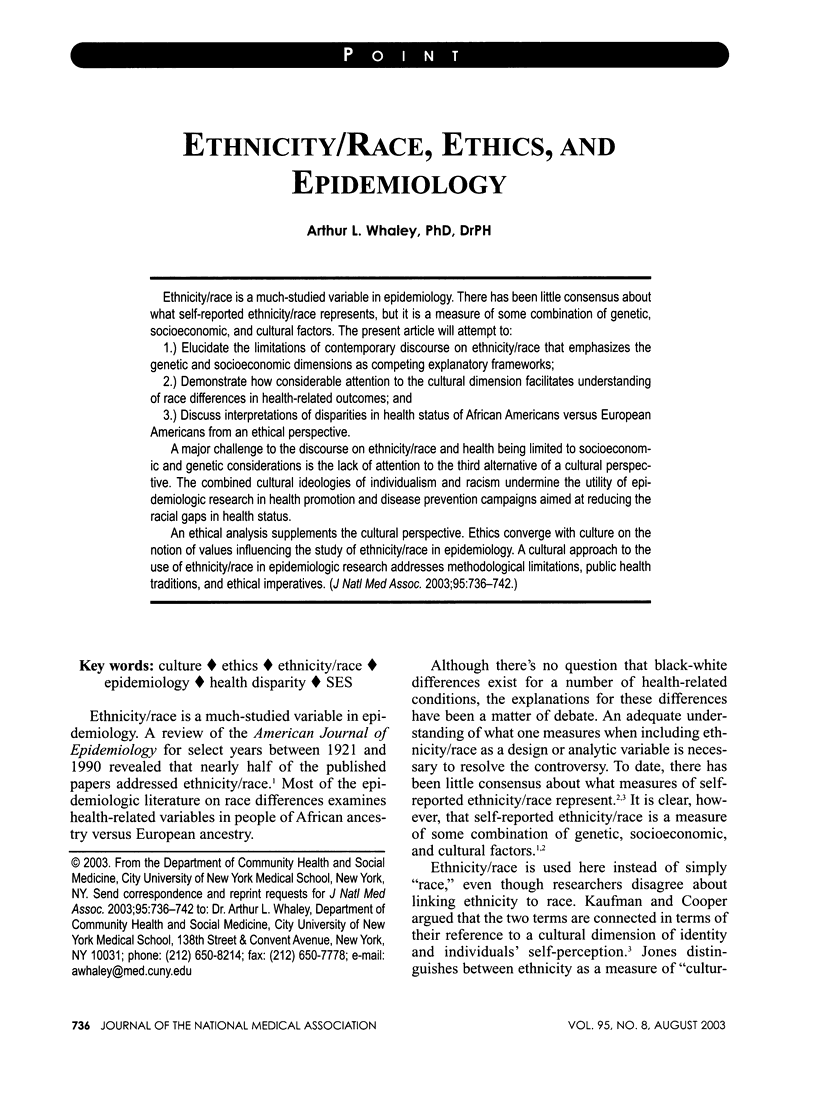
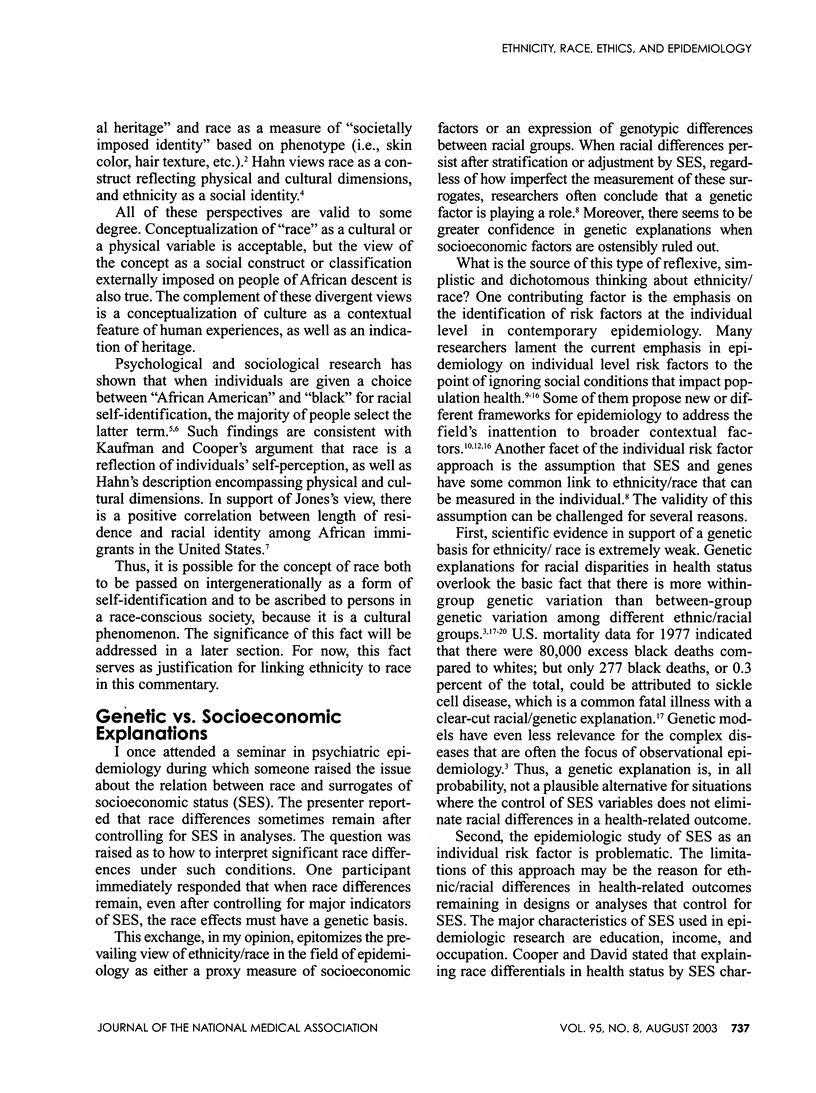
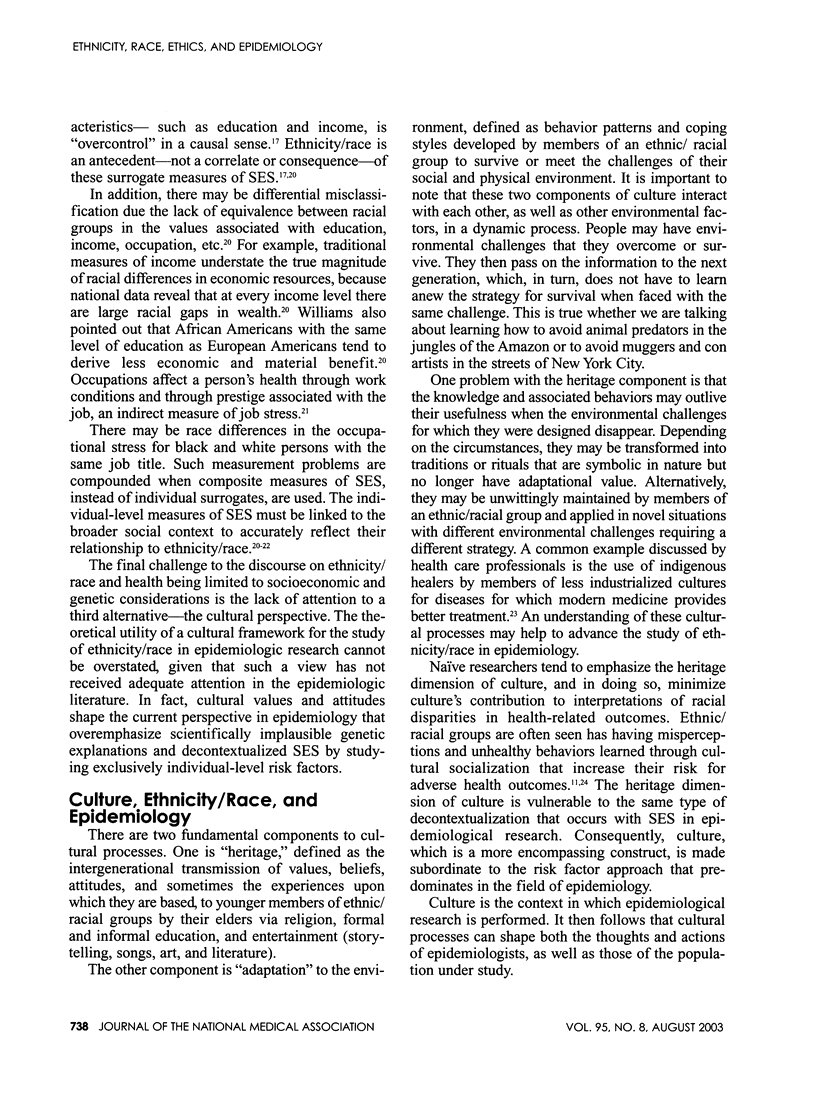
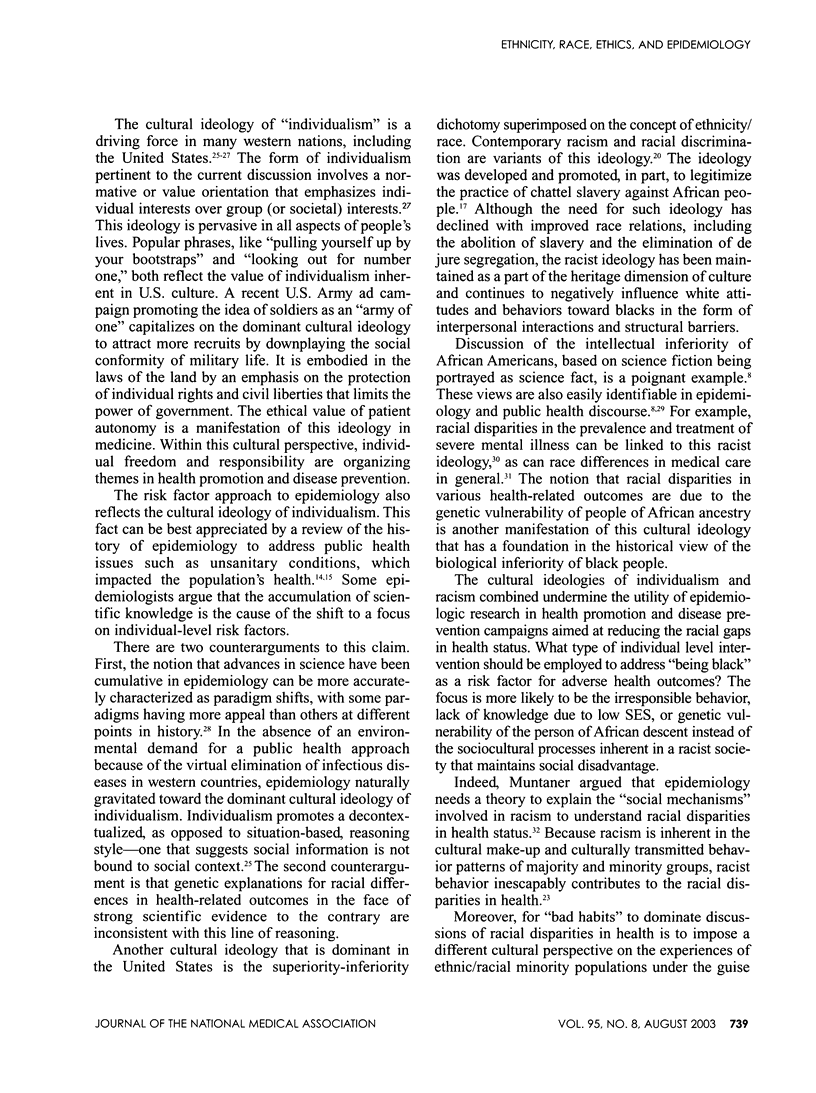
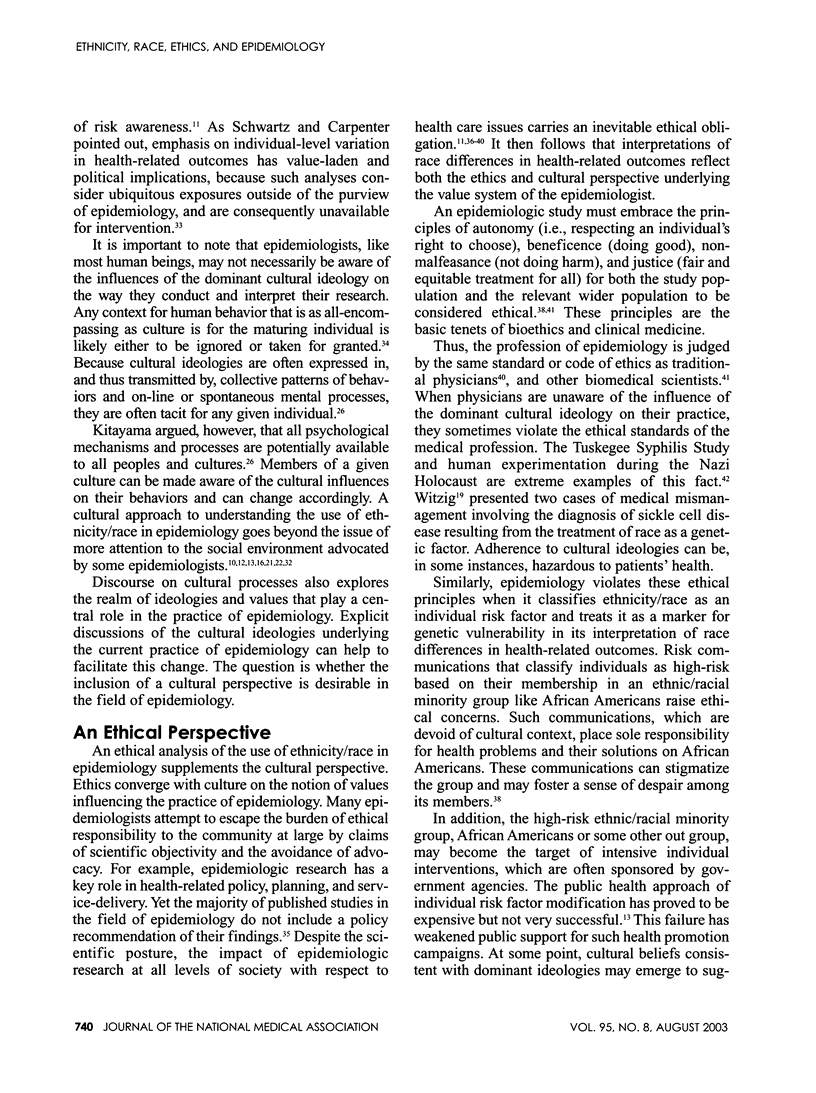
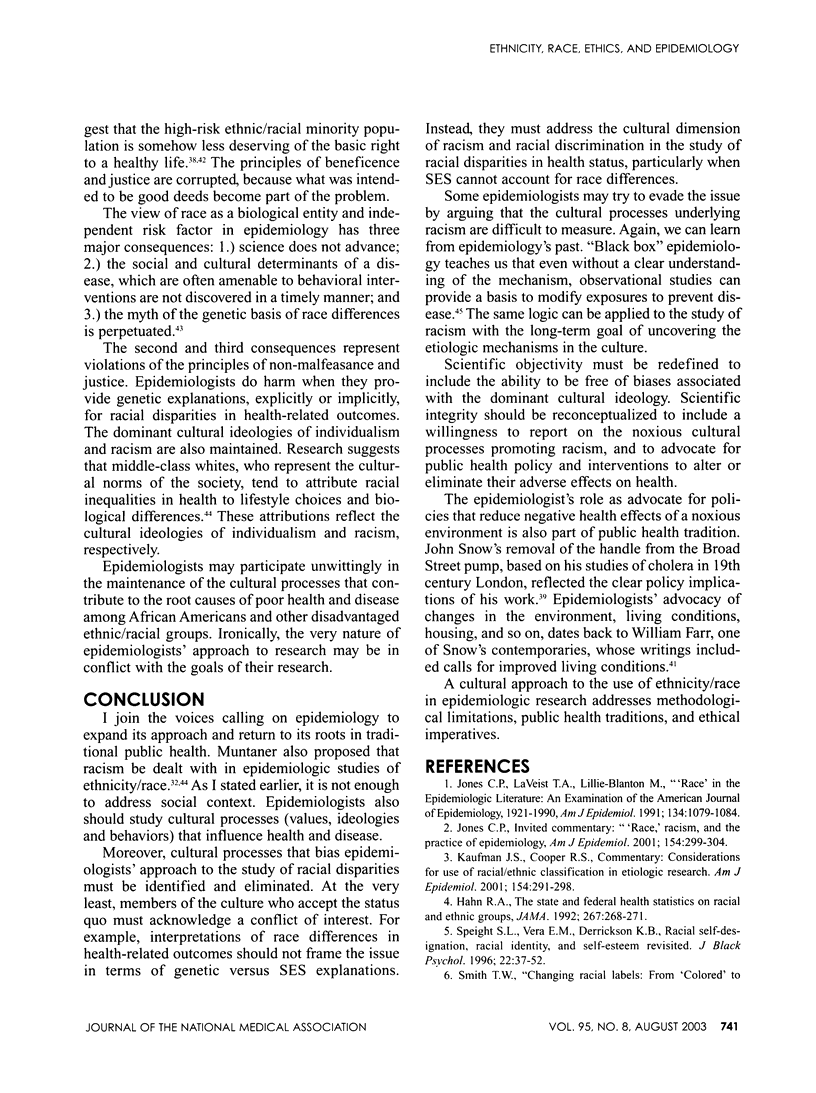
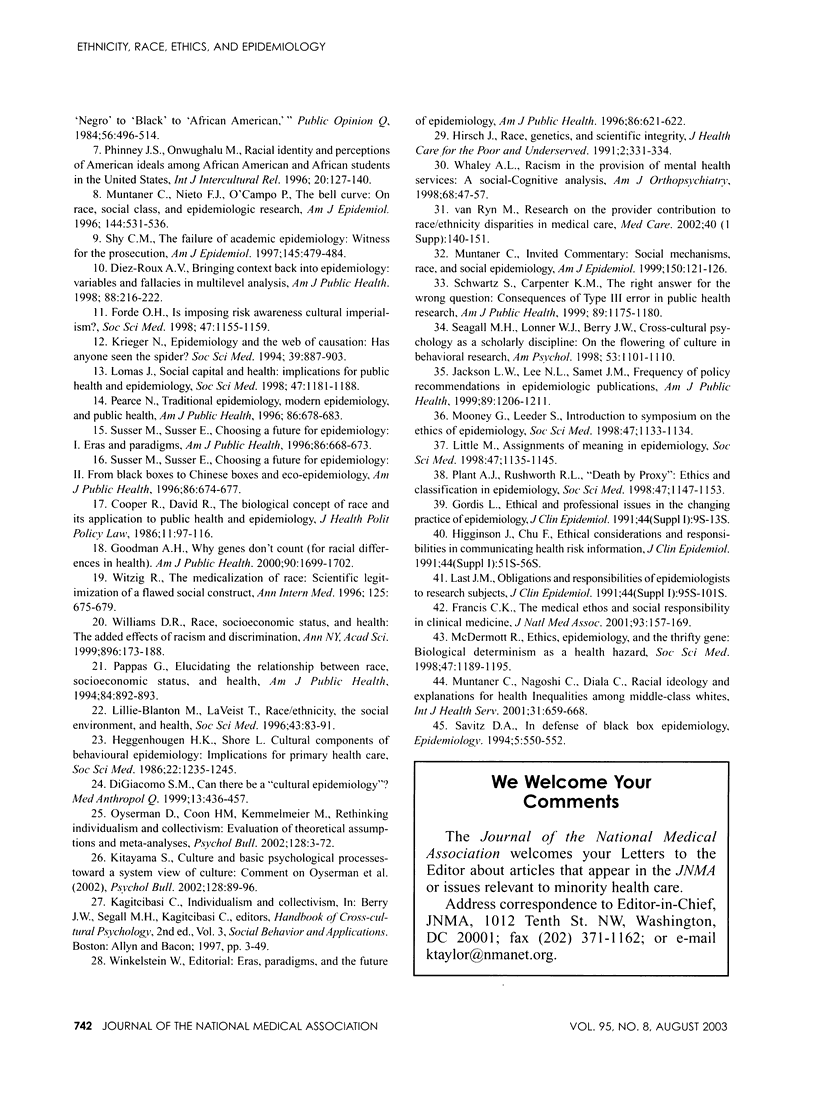
Selected References
These references are in PubMed. This may not be the complete list of references from this article.
- Cooper R., David R. The biological concept of race and its application to public health and epidemiology. J Health Polit Policy Law. 1986 Spring;11(1):97–116. doi: 10.1215/03616878-11-1-97. [DOI] [PubMed] [Google Scholar]
- DiGiacomo S. M. Can there be a "cultural epidemiology"? Med Anthropol Q. 1999 Dec;13(4):436–457. doi: 10.1525/maq.1999.13.4.436. [DOI] [PubMed] [Google Scholar]
- Diez-Roux A. V. Bringing context back into epidemiology: variables and fallacies in multilevel analysis. Am J Public Health. 1998 Feb;88(2):216–222. doi: 10.2105/ajph.88.2.216. [DOI] [PMC free article] [PubMed] [Google Scholar]
- Francis C. K. The medical ethos and social responsibility in clinical medicine. J Natl Med Assoc. 2001 May;93(5):157–169. [PMC free article] [PubMed] [Google Scholar]
- Førde O. H. Is imposing risk awareness cultural imperialism? Soc Sci Med. 1998 Nov;47(9):1155–1159. doi: 10.1016/s0277-9536(98)00187-7. [DOI] [PubMed] [Google Scholar]
- Goodman A. H. Why genes don't count (for racial differences in health). Am J Public Health. 2000 Nov;90(11):1699–1702. doi: 10.2105/ajph.90.11.1699. [DOI] [PMC free article] [PubMed] [Google Scholar]
- Gordis L. Ethical and professional issues in the changing practice of epidemiology. J Clin Epidemiol. 1991;44 (Suppl 1):9S–13S. doi: 10.1016/0895-4356(91)90168-9. [DOI] [PubMed] [Google Scholar]
- Hahn R. A. The state of federal health statistics on racial and ethnic groups. JAMA. 1992 Jan 8;267(2):268–271. [PubMed] [Google Scholar]
- Heggenhougen H. K., Shore L. Cultural components of behavioural epidemiology: implications for primary health care. Soc Sci Med. 1986;22(11):1235–1245. doi: 10.1016/0277-9536(86)90190-5. [DOI] [PubMed] [Google Scholar]
- Hirsch J. Race, genetics, and scientific integrity. J Health Care Poor Underserved. 1991 Winter;2(3):331–334. doi: 10.1353/hpu.2010.0046. [DOI] [PubMed] [Google Scholar]
- Jackson L. W., Lee N. L., Samet J. M. Frequency of policy recommendations in epidemiologic publications. Am J Public Health. 1999 Aug;89(8):1206–1211. doi: 10.2105/ajph.89.8.1206. [DOI] [PMC free article] [PubMed] [Google Scholar]
- Jones C. P. Invited commentary: "race," racism, and the practice of epidemiology. Am J Epidemiol. 2001 Aug 15;154(4):299–306. doi: 10.1093/aje/154.4.299. [DOI] [PubMed] [Google Scholar]
- Jones C. P., LaVeist T. A., Lillie-Blanton M. "Race" in the epidemiologic literature: an examination of the American Journal of Epidemiology, 1921-1990. Am J Epidemiol. 1991 Nov 15;134(10):1079–1084. doi: 10.1093/oxfordjournals.aje.a116011. [DOI] [PubMed] [Google Scholar]
- Kaufman J. S., Cooper R. S. Commentary: considerations for use of racial/ethnic classification in etiologic research. Am J Epidemiol. 2001 Aug 15;154(4):291–298. doi: 10.1093/aje/154.4.291. [DOI] [PubMed] [Google Scholar]
- Kitayama Shinobu. Culture and basic psychological processes--toward a system view of culture: comment on Oyserman et al. (2002). Psychol Bull. 2002 Jan;128(1):89–96. doi: 10.1037/0033-2909.128.1.89. [DOI] [PubMed] [Google Scholar]
- Krieger N. Epidemiology and the web of causation: has anyone seen the spider? Soc Sci Med. 1994 Oct;39(7):887–903. doi: 10.1016/0277-9536(94)90202-x. [DOI] [PubMed] [Google Scholar]
- Lillie-Blanton M., Laveist T. Race/ethnicity, the social environment, and health. Soc Sci Med. 1996 Jul;43(1):83–91. doi: 10.1016/0277-9536(95)00337-1. [DOI] [PubMed] [Google Scholar]
- Little M. Assignments of meaning in epidemiology. Soc Sci Med. 1998 Nov;47(9):1135–1145. doi: 10.1016/s0277-9536(98)00185-3. [DOI] [PubMed] [Google Scholar]
- Lomas J. Social capital and health: implications for public health and epidemiology. Soc Sci Med. 1998 Nov;47(9):1181–1188. doi: 10.1016/s0277-9536(98)00190-7. [DOI] [PubMed] [Google Scholar]
- McDermott R. Ethics, epidemiology and the thrifty gene: biological determinism as a health hazard. Soc Sci Med. 1998 Nov;47(9):1189–1195. doi: 10.1016/s0277-9536(98)00191-9. [DOI] [PubMed] [Google Scholar]
- Muntaner C. Invited commentary: social mechanisms, race, and social epidemiology. Am J Epidemiol. 1999 Jul 15;150(2):121–128. doi: 10.1093/oxfordjournals.aje.a009970. [DOI] [PubMed] [Google Scholar]
- Muntaner C., Nagoshi C., Diala C. Racial ideology and explanations for health inequalities among middle-class whites. Int J Health Serv. 2001;31(3):659–668. doi: 10.2190/C496-24X1-Y2KN-Q9JJ. [DOI] [PubMed] [Google Scholar]
- Muntaner C., Nieto F. J., O'Campo P. The Bell Curve: on race, social class, and epidemiologic research. Am J Epidemiol. 1996 Sep 15;144(6):531–536. doi: 10.1093/oxfordjournals.aje.a008962. [DOI] [PubMed] [Google Scholar]
- Oyserman Daphna, Coon Heather M., Kemmelmeier Markus. Rethinking individualism and collectivism: evaluation of theoretical assumptions and meta-analyses. Psychol Bull. 2002 Jan;128(1):3–72. [PubMed] [Google Scholar]
- Pappas G. Elucidating the relationships between race, socioeconomic status, and health. Am J Public Health. 1994 Jun;84(6):892–893. doi: 10.2105/ajph.84.6.892. [DOI] [PMC free article] [PubMed] [Google Scholar]
- Pearce N. Traditional epidemiology, modern epidemiology, and public health. Am J Public Health. 1996 May;86(5):678–683. doi: 10.2105/ajph.86.5.678. [DOI] [PMC free article] [PubMed] [Google Scholar]
- Plant A. J., Rushworth R. L. "Death by proxy": ethics and classification in epidemiology. Soc Sci Med. 1998 Nov;47(9):1147–1153. doi: 10.1016/s0277-9536(98)00186-5. [DOI] [PubMed] [Google Scholar]
- Savitz D. A. In defense of black box epidemiology. Epidemiology. 1994 Sep;5(5):550–552. [PubMed] [Google Scholar]
- Schwartz S., Carpenter K. M. The right answer for the wrong question: consequences of type III error for public health research. Am J Public Health. 1999 Aug;89(8):1175–1180. doi: 10.2105/ajph.89.8.1175. [DOI] [PMC free article] [PubMed] [Google Scholar]
- Shy C. M. The failure of academic epidemiology: witness for the prosecution. Am J Epidemiol. 1997 Mar 15;145(6):479–487. doi: 10.1093/oxfordjournals.aje.a009133. [DOI] [PubMed] [Google Scholar]
- Susser M., Susser E. Choosing a future for epidemiology: I. Eras and paradigms. Am J Public Health. 1996 May;86(5):668–673. doi: 10.2105/ajph.86.5.668. [DOI] [PMC free article] [PubMed] [Google Scholar]
- Susser M., Susser E. Choosing a future for epidemiology: II. From black box to Chinese boxes and eco-epidemiology. Am J Public Health. 1996 May;86(5):674–677. doi: 10.2105/ajph.86.5.674. [DOI] [PMC free article] [PubMed] [Google Scholar]
- Whaley A. L. Racism in the provision of mental health services: a social-cognitive analysis. Am J Orthopsychiatry. 1998 Jan;68(1):47–57. doi: 10.1037/h0080269. [DOI] [PubMed] [Google Scholar]
- Williams D. R. Race, socioeconomic status, and health. The added effects of racism and discrimination. Ann N Y Acad Sci. 1999;896:173–188. doi: 10.1111/j.1749-6632.1999.tb08114.x. [DOI] [PubMed] [Google Scholar]
- Winkelstein W., Jr Eras, paradigms, and the future of epidemiology. Am J Public Health. 1996 May;86(5):621–622. doi: 10.2105/ajph.86.5.621. [DOI] [PMC free article] [PubMed] [Google Scholar]
- Witzig R. The medicalization of race: scientific legitimization of a flawed social construct. Ann Intern Med. 1996 Oct 15;125(8):675–679. doi: 10.7326/0003-4819-125-8-199610150-00008. [DOI] [PubMed] [Google Scholar]


